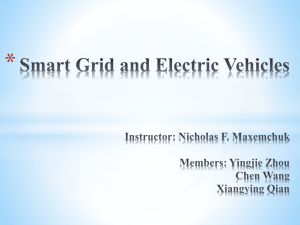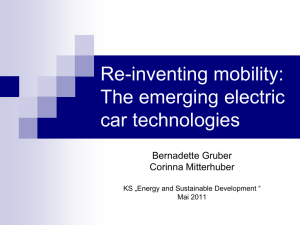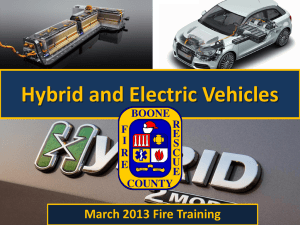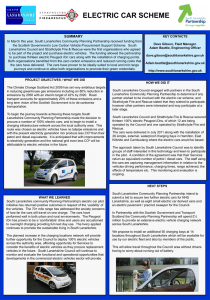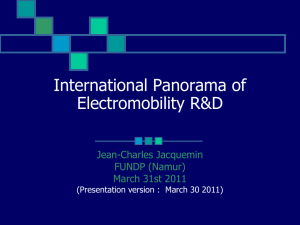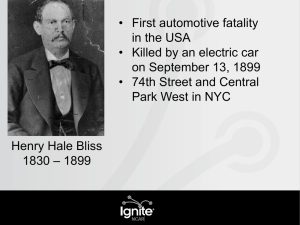Diapositive 1
advertisement
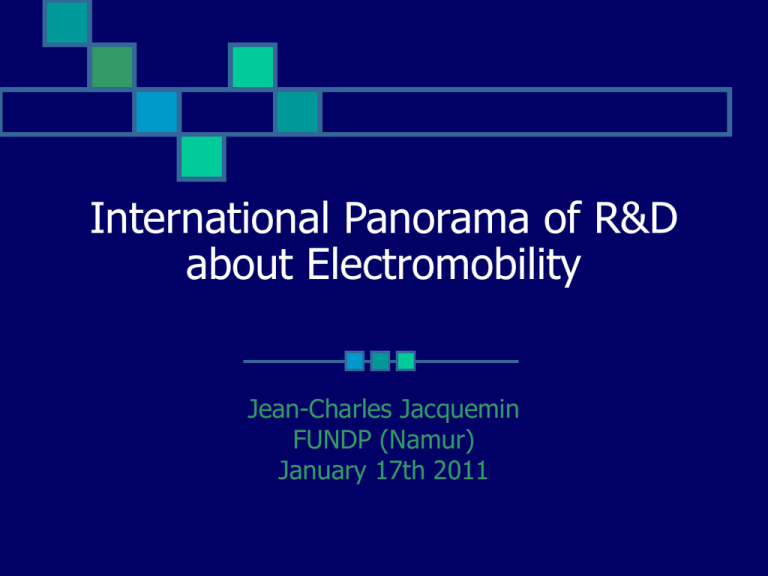
International Panorama of R&D about Electromobility Jean-Charles Jacquemin FUNDP (Namur) January 17th 2011 Presentation 1. Which panorama ? A mind mapping structure. 2. 3. The panorama 0 in its four dimensions Main trends 1. Which panorama ? Reminder : New problem given the interaction between: Techniques Managerial aspects Sociopolitical aspects Economic issues Implying the need for a « holistic » survey technological one. global vision and of an rather than an only Difficulties : Too simple and overly structured approach 2. Exponential growth of the number of relevant informations Leading to an Accumulation of non correctly sorted sources 1. Answer A mind mapping exercise to systematically organize new information resources (texts, internet links, images, …) leading eventually to a content management system (CMS). Mind mapping 2nd level (1/3) Mind mapping 3rd level (2/3) Mind mapping 4th level (3/3), etc. 2. Panorama 0 : Synthetic Results Technology (1/27) Electricity storage : Batteries 1. The continuation of a pseudo Moore's law for batteries with second generation silicon fibres : Nexeon has an objective of a 4Ah battery for 2011 (Starting from today's 3,2 Ah). Nexeon has developed and patented a novel way of structuring silicon so that it delivers extended cycle life and significantly increases anode charge capacity—almost ten times the gravimetric capacity per gram (mAh g-1) compared to carbon anodes. Used in combination with a standard cathode, this can increase cell capacity by 30-40%, Nexeon says. (link) 2. The estimation that it will take 5 years to get competitive batteries. (link) 3. The use of biochemistery to self assemble and to increase the battery capacity (by a tenfold factor as estimated) through nonastructures created by Bacillus subtilis bacteria or tobacco mosaic virus. (link) Technology (2/27) Electricity storage : metal-air batteries Some significative developments have been realized in the field of air metal batteries. 1. The creation of a corporation that actually produces zinc metal batteries ZINC AIR INC. (link) 2. The affirmation that zinc is largely more abundant and less stategically sensible than lithium :"Worldwide resources of zinc total more than 1.8 gigatonnes — with more than 35 percent of that in the United States alone. Global zinc production in 21 months would be sufficient to produce one billion 10 kWh zinc air batteries — by contrast it would take 180 years of lithium production to produce those same batteries. (…) Lithium supply and future production will be far from adequate to sustain global electric vehicle production.” (LLNL web site (link) ) Technology (3/27) 3. The affirmation by Renault that : "Renault’s next step is experimenting with all new chemistry, possibly zincair or zinc-silver, due in around 2025, which could boost EV range to 300 miles between charges." (link) 2. The affirmation by Ford Motor that : “Lithium-ion air (Li-Air) is the current focus of Ford’s development efforts, as it produces both a far greater realised galvimetric energy density (Wh/kg) and far greater realised volumetric energy density (Wh/L) than Li-ion, Li polymer, NiMH, NiCd, lead acid, or even gasoline or diesel.”(link) Technology (4/27) Electricity storage : supercapacitors Some significative developments have been realized in the field of supercapacitors. Researchers in the US have made a graphene-based supercapacitor that can store as much energy per unit mass as nickel metal hydride batteries - but unlike batteries, it can be charged or discharged in just minutes or even seconds. The new device has a specific energy density of 85.6 Wh/kg at room temperature and 136 Wh/kg at 80 °C. These are the highest ever values for "electric double layer" (…) The new device was made by Bor Jang of US-based Nanotek Instruments "Our goal is to make a supercapacitor that stores as much energy as the best lithium-ion batteries (for the same weight) but which can still be recharged in less than two minutes," said Jang." (link) Technology (5/27) Recharging by wire : An EDF information letter (File ) on electric mobility states that : "The principal conclusions are that : 1. first off, given the current travel habits of French drivers, athome parking and at work parking would be more than sufficient time for recharging vehicles at normal charge (3 kW); 2. and secondly, that lengths of time parked in public areas would not allow for more than an emergency charge. » Technology (6/27) Wireless recharging : Battery swapping (1/3) 1. The BSS (Battery swapping stations) are not so difficult to manage : « On the stocking a large number of batteries, one switch station can support hundreds of taxis. For example, if you have a lane in the switch station that has 12 batteries, each being switched every 3 minutes, that equals 20 cars that can be charged in hour off of 12 batteries. The batteries are cycled through and quick charged in about 30 minutes as they come in, so you won’t need to stock dozens. » (link) 2. The BSS are a technology supported by major actors : the Chinese, Australian, Danish and Israeli governments, Renault, Chery and other carmakers. (link) Technology (7/27) Wireless recharging : Battery swapping (2/3) 3. Switching different battery types has been anticipated by Betterplace (link) 4. Swapping batteries is the best solution for E-taxis and a deployment is planned in the Bay Area (link) after the positive Tokyo experimentation (link) "Since taxis drive nearly continuously, they require instant charge of their battery to maintain quality of service and continue serving the public. Given the taxi business, waiting three to four hours for standard charge is not an option. Battery switch is the only option that allows the driver to recharge in less time than it takes to refuel, the means of range extension for today’s gas-powered taxis." Technology (8/27) Wireless recharging : Battery swapping (3/3) 5. BSS are evaluated in the EU financed Project MERGE (link). « While the investment in a station to replace batteries in urban areas, covering a high number of EV, makes economic sense, the individual charger is the solution that fits the rural areas better, as battery replacement stations are likely to be economically unfeasible due the low geographic density of EV. When EV are required to make long trips, battery replacement stations will start appearing outside city areas, perhaps nearby main roads. » 6. Swappable batteries have been installed in the PVI waste collecting trucks that have been bought by SITA in France and will enter service in early 2011. (link) Technology (9/27) Energy generation on board with fossil fuels The concept of extended range has been industrially implemented in the first commercially available car : the Chevrolet Volt and will be available in Europe in the Opel Ampera, Tata introduces e-buses with onboard electricity generation. 1. The commercial production of the Chevrolet Volt has begun on Nov. 30th. (link). 2. The family of E-rev cars counts a new member in Asia : a Proton (link). 3. Tata e-buses use a CNG generator on board (link) to extend the range. 4. The Hybrid light truck Bremach T-rex is also in production (link). For the prospectus see the (file). Technology (10/27) Type of vehicles : 2 wheels E-bikes See for instance this internet catalog, their form, types, number is exploding (link). Technology (11/27) Type of vehicles : 2 wheels E-scooters See for instance this internet catalog, their form, types, number is exploding (link). The Zappy (second picture) has been choosen by the Charleroi Hospital. Technology (12/27) Type of vehicles : 3 wheelers The Triac should be on the roads by the end of 2011. base price 25,000 $ before fiscal incentives, range 100 miles, max speed 80 mph. For other characteristics see the (link). Technology (13/27) Type of vehicles : electric cars (1/2) A. The range extender technology has been developed (see above). B. World premieres : 4. The first Nissan Leaf has been delivered to a consumer in California, and the first 10 Nissan Leafs have been delivered in Portugal on Dec. 24th 2010.(link) 5. The first Volt has been sold to an American customer. 6. The first Renault Fluence has been produced. C. The practicability of ecars is a new preoccupation, even small city cars are adapted to increase their transportation capacity. 7. As an example the THINK car sold in this version in Norway since December 2010 and on sale in UK in the beginning of 2011 (link). Technology (14/27) Type of vehicles : electric cars (2/2) D. New partnerships arise : 8. Nissan and Mitsubishi have just signed a collaboration agreement to work together even more closely than they have in the past, sharing vehicle platforms for both worldwide and Japanese domestic markets. And perhaps, just perhaps, the two Japanese automakers may end up working on an electric vehicle together(link) E. Production announcements 9. After BMW, another important German manufacturer, Mercedes announces a small Mercedes which will form part of the company's Mega City Mobility program. It will, of course, be powered by an electric motor and share a platform with the rear-engined platform of the next Smart Fortwo. No production date however (link) 10. As a competitor to the Nissan Leaf, Ford presents the Electric Ford Focus which will be on sale in the US for the end of 2011 (link) together with other Ford projects like the C-MAX Energi Plug-in Hybrid Technology (15/27) Type of vehicles : e-taxis 1. E-taxis are a prime target for electrification. See a research paper from EDF that shows why and how (link) 2. Betterplace uses its e-taxi Tokyo experience (link) to develop a greater project in the Bay area of California.(link) 3. VW reveals the project of its e-taxi. (link) Technology (16/27) Type of vehicles : e-vans 1. The Mercedes Vito e-cell full electric van is now commercially available for deliveries in mid-2011 : this van will indeed be available in long-term rentals (4 years/80, 000 km) at a monthly rate of 1 790 euros all inclusive VAT (maintenance, insurance, cleaning, tires, etc..). Of the 2,000 copies of planned production for the year 2011 a quarantine will be allocated to France. The Vito E-Cell announces a range of 130 km, a maximum speed of 80 km/h and a payload of 900 kg .... (link) 2. Only a few weeks after Mercedes Benz pioneered in offering the Vito ECell electric van, Iveco decided to launch its EcoDaily Electric van and chassis cab in the UK and Ireland.Prices start from £40,000, with the batteries available to lease separately. Prices for the vehicle and batteries combined start from £63,000. Technology (17/27) Type of vehicles : light trucks 1. The French PVI offers electric light trucks in collaboration with Renault trucks, so is the Concept-truck Maxity. the electric Maxity is proposed to pilot clients wanting to benefit from the electric traction in their business especially : - in town deliveries, - urban cleaning, - public garden and parks tending, - public lightning and networks. (link) 2. Bremach USA introduces T-REX 4x4 class-3 electric drive truck: BEV or series hybrid/ The 10,000+ lb GVWR electric-drive T-REX offers a 3.87 ton payload—enabled by an adaptive modular space frame chassis architecture—and is powered by a 200 kW peak (150 kW continuous), 360 N·m peak torque brushless DC permanent magnet motor. The 40 kWh Liion pack is built with large-format prismatic cells. Range varies between 70 to 100 miles. For more details see the links. . Technology (18/27) Type of vehicles : e-bus (1/2) 1. Visitors to EVs 25 in Shenzen have been impressed by the E-Buses and ETaxis. A review of comparative costs with diesel buses in China shows that substantial savings may be achieved : "At current electricity costs of 72 RMB (€8) for a 100 km ride, and given that the average Chinese bus covers 250 km each day, one e-bus would cost around 64,000 RMB (€6,870) of “fuelling costs” per annum. Compared to a conventional model, over a normal life time of 8 years, up to 1.26 million RMB (€136,057) can be saved just from fuel costs » (link) 2. Madrid has bought 10 serial hybrid buses (electric motor + CNG generator) from Tata motors that will be delivered in 2012. Capacity 32 people, max speed 70 km/h (link) 3. PVI in France proposes different e-buses, see their website (link) Technology (19/27) Type of vehicles : e-bus (2/2) 4. The Zeus M200 E from BredaMenarinibus :" the new lithium -ion batteries provide ZEUS with premium features on the electric minibus market. Speed and acceleration performances also increase as a consequence of more than 500 kilos of weight saving and moreover the new lithium batteries allow a range of 120 km in a typical urban duty cycle." (link) 5. "On December 21st, the Seoul Metropolitan Government (SMG) launched commercial operation of its fleet of five electric buses, which immediately began servicing the city's Mt. Namsan circular routes. The electric coaches are big, measuring over 36 feet long, and can ferry passengers for up to 52 miles on a single charge while operating at a maximum speed of 62 miles per hour. When the juice is running low, the buses pull up to one of the area's two quick-charge stations for a 30-minute fill." (link) More e-buses will complete the fleet as nine supplementary ones will replace the conventional diesel buses. Technology (20/27) Type of vehicles : Heavy and special vehicles (1/2) 1. New electric municipal sweepers : Tennant : A new electric municipal sweeper that reduces dramatically the energy costs : « Compared with thermal sweepers, this electric model is twice as expensive but the operator will compensate the initial purchase cost through reduced operating costs. » « A thermal sweeper consumes 50 liters of fuel daily, or about 70 €, while our electric model costs only 2 € / day for its electricity. », explains a sales representative. Tennant France also offers to lease its sweeper and is working on a solution for acquiring the vehicle and lease the battery pack . (link) Technology (21/27) Type of vehicles : Heavy and special vehicles (2/2) Prodim : Lyon France : A new electric municipal sweeper that reduces the total ownership costs (note : Nice already owns three such municipal sweepers) (link) : Even if it takes an initial investment of an extra 15,000 € , the operator will achieve the long-term savings. "A street sweeper thermal costs about 7 € / hour while our electric model costs only 90 cents. In addition, the maintenance cost is divided by three ... in about 5 years, the operator can save between 15 and 20 k € in operating costs." From a Prodim representative. 2. A new refuse collecting truck completely electric and with swappable batteries, bought by SITA (subsidiary of SUEZ France), 11 trucks will be in service strating in early 2011 in Courbevoie; (link in French) (link in English). Technology (22/27) E-Vehicle conception : new materials (1/2) New materials are developed to increase the efficiency of EVs. (link) New tires with low rolling resistance, less weight. New glass and windows (with less solar impact on the climate and the materials of the vehicle) Composite structure of the body, as an example the SMG ebuses (link) "SMG's electric buses were developed with assistance from Hyundai Heavy Industries and Hankuk Fiber. The coach's body features a carbon composite material, which is claimed to both reduce the vehicle's overall weight and enhance its durability." or the new carbonfiber body parts of the BMW Megacity vehicle forseen for 2013 (link) (link2 more important) . "BMW will invest nearly 400 million euros in Megacity Vehicle production and will create over 800 jobs at the Leipzig plant. The positive impact on this region is expected to be high since most of the parts are produced in Germany. The carbonfiber will be manufactured by SGL Group and BMW at the plant in Moses Lake, WA. Megacity Vehicles will then be assembled at Leipzig Werks." Technology (23/27) E-Vehicle conception : new materials (2/2) « BMW, 3 years from now,will launch a new construction type to Cars called as Megacity Vehicle (MCV), which won’t contain steel or aluminum bodywork. Instead, it will have a light alloy frame in the car floor and a body made of carbon fiberreinforced polymer (CFRP). CFRP is a dull black material which has a chemical structure similar to that of diamonds. It is sturdier than steel and weighs less than half as much. The MCV body will be 250 to 300 kilograms (550 to 660 pounds) lighter than that of a conventional electric car of the same size, compensating fully for the additional weight of the batteries. » Technology (24/27) E-Vehicle conception : V2G A London conference on EV charging (Nov.30 – Dec. 1) «EV charging and grid integration: A commercially viable and profitable reality » has concluded that new business models should focus on "Advanced charging infrastructures to (...) anticipate demand‐side management and V2G enabled charging » link) and (link 2) . See below Management issues (4/5) Technology (25/27) E-Vehicle conception : Security (1/2) On jan. 5 2011, The "Bell Bill" has been signed by the US President Obama. See Sociopolitical Aspects (2/6) below. Technology (26/27) E-Vehicle conception : Security (2/2) « At the Detroit Auto Show 2011 Volvo Cars is spotlighting the important issue of electric car safety in an unusual, but distinctive way. On the company's stand there is a Volvo C30 Electric that has undergone a frontal collision test at 40 mph (64 km/h). « Our tests show it is vital to separate the batteries from the electric car's crumple zones to make it as safe as a conventional car. In Detroit we are the first car maker to show the world what a truly safe electric car looks like after a collision with high-speed impact," says Volvo Cars' President and CEO Stefan Jacoby.» » ( link) . Technology (27/27) Networks : Electric grids 1. An EU financed project seems to cover many aspects of the problem of grid management. It is the Project MERGE : as announced on their website: "Mobile Energy Resources for Grids of Electricity" is a major EUfinanced project to prepare the European electricity grid for the spread of electric vehicles. (link) 2. An Australian study investigates the effects on the security of supply of energy during these previously unseen demand patterns, while also examining changes to spot market prices and changes in emissions rates (link). It may compared to the Creg research paper of February 2010. Economic Challenges Macroeconomic strategies : Very interesting and well documented study by Liam Wagner and Luke Reedman on " Modeling the deployment of plug-in hybrid and electric vehicles and their effects on the Australian National Electricity Market" that shows " that wholesale prices during the off-peak period will increase slowly over time with controlled charging. While uncontrolled charging increases the incidence of extreme price events and a considerable number of hours with unserved energy within the network. This increase in spot prices will require further review by policy makers of regulated retail electricity tariffs. We expect the transfer of greenhouse gas emissions from petrol fueled personal transportation to electricity generation will assist Australia in achieving emissions reductions from the transport sector. (...) Increases to spot price exposure for electricity retail firms could signal possible tariff price restructuring for retail consumers." (link) Economic Challenges (2/5) Financial risks and opportunities for consumers : ecars prices The Chevrolet Volt, Opel Ampera, Nissan Leaf, Renault Fluence MRSP are known. In the USA : Chevrolet Volt : 41.000 $ (The car is also available through a lease program. It can be leased for 3-years/36 months and 12,000 miles per year for $350 per month and $2500 down payment.) Nissan Leaf : around 33.000 $ in the US (link) In Europe : Opel Ampera : 42,900 € ATI (without national bonus) (link) Renault Fluence and Kangoo (link) separate the price for the vehicle and the cost of battery rental: Fluence : 21,300 € ATI (bonus included 5,000 €) + from 79€ ATI / month* (36 months, 10 000 km /year) Kangoo : 15,000 € ATI (bonus included 5,000 €) + from 72€ ATI / month* (48 months, 15 000 km /year) Economic Challenges (3/5) Market penetration : forecasts (most interesting) (1/2) 1. Some predict that 20% of cars sales will be E-cars sales by 2016 in UK given the huge government incentives. (link) 2. And "About 954,000 electric volt cars and hybrids, including plug-in models, will sell this year worldwide, comprising 2.2% of all car sales, industry forecaster J.D. Power and Associates estimated in October, Bloomberg reported. By 2020, just 5.2 million, or less than 10% of the estimated 71 million cars to be sold, are expected to be electric. And according to a Kelly Blue Book survey, only 7% of car shoppers will even consider buying or leasing a new electric car because of the reduced travel range and availability of charging stations. " (link) Economic Challenges (4/5) Market penetration : forecasts (most interesting) (2/2) 3. From IBTimes : "According to a recent report from Bloomberg New Energy Finance, plug-in electric vehicles, including plug-in hybrids and battery electric vehicles, have the potential to make up 9 percent of auto sales in 2020 and 22 percent in 2030 (1.6 million and 4 million vehicle sales respectively)." (link) 4. From Edmunds.com, we get this forecast (link) : "Edmunds.com analysts report that about 2.4 percent of all the new cars sold in 2010 were hybrid or electric. Despite the excitement surrounding the Volt, the Leaf and other new entries in the green car segment, Edmunds.com expects alternative vehicle market share to rise to just 3.7 percent in 2011, to 4.1 percent in 2012 and to 4.8 percent in 2013. Part of the explanation for the slow consumer acceptance is the uncertainty of the new technology. For one thing, people are unsure how much it will cost to own these cars." Economic Challenges From Wagner and Reedman (link) (4/5) Management Issues EV car sharing Nice is the first French town to implement its EV car sharing plan (link) : Phase 1: Rapid deployment of vehicles and stations in 2011 • 51 cars and 17 service stations on March 30th, 2011 (15 in Nice, Cagnes sur Mer 1, 1 in Saint-Laurent du Var). • Including an offer of 10 utilities from Venturi March 2011 • 129 vehicles and 43 stations in operation before the end of 2011 • A variety of 3 models ( 40 Peugeot iOn, 10 Citroën Berlingo Venturi and the Mia from Heuliez) for different uses in the summer of 2011. Phase 2: A modular deployment to allow an adjustment based on the results of 2011 and introduce new models of vehicles (210 vehicles and 70 stations by end 2012) Management Issues New partnerships (2/5) (1/2) 1. The Plug-in Hybrid Vehicle demonstration in Strasbourg. (link) 2. The Renault Nissan Alliance is particularly active : developing partnerships with the E. Leclerc supermarkets ( 50 supermarkets end 2011 , 150 end 2012, ± 500 end 2015), the Vinci parkings, the Unibail-Rodamco commercial malls (36 malls with quick charging post for the end of 2012). (link) 3. The MeRegio Mobil plan in Germany : the establishment and operation of an intelligent charging and feeding back infrastructure for electric vehicles. (link) 4. The MOBI.E partnership in Portugual (link) Management Issues New partnerships (3/5) (2/2) 5. Nissan and Mitsubishi agree to set up a 50-50 joint company next year to develop electric minicars that may become strategic models sold globally. (link) 6. Nissan, NEC and Sumimoto have signed a MoU in an effort to promote a membership-based charging service for electric vehicles. Under terms laid out in the MoU, the trio of companies will conduct a study aimed at developing charging facilities that can provide continuous and readily accessible service to EV drivers that elect to take part in the membership program. The partnership is seen as having the key benefit of a membership-based charging service : it would lie in the ability to monitor charger usage and install additional stations – or relocate some – based on the information obtained. (link) Management Issues (4/5) EV charging and grid integration: A commercially viable and profitable reality : a summary of "The EV Charging Infrastructure & Grid Integration 2010" event (1/2) (See also above : Technology (24/27) > Vehicle conception > V2G) "Business models needed for implementing charging poles : 1. Advanced charging infrastructures to: •Adopt new European standards (when confirmed) •Develop national and international clearing and roaming capability •Anticipate demand‐side management and V2G enabled charging 2. Homogenous and non‐exclusive charging network The main focus point here is to understand the driving routes of electric vehicles and build infrastructure user-case related. This is crucial to: •Avoid local duplication •Work with OEM’s to provide a list of homologated hardware suppliers •Keep energy costs and access fees low and easy to manage Management Issues (5/5) EV charging and grid integration: A commercially viable and profitable reality : a summary of "The EV Charging Infrastructure & Grid Integration 2010" event (2/2) (See also above : Technology (24/27) > Vehicle conception > V2G) 3. Improve and innovate charging facilities: Allow additional services such as charge point reservation & payment Charging stations must also have additional attractions such as restaurants, hotels, shopping areas, etc. Implement smart navigation systems to link charging opportunities Introduce cross‐border roaming Develop a network of quick-charging stations" Sociopolitical Aspects National plans and actions : 1. The resources present the national plans of Germany (link1) , Portugal (link2) and the French Borloo plan (link3). 2. The 2010 Spanish Initiatives in the Electromobility Sector are detailled in this file (link4). 3. On Jan 1st 2011, Monaco introduced free parking for EVs (link5) Sociopolitical Aspects (2/6) Reglementations : The "Bell Bill" has been signed by the US President Obama. « Thanks to new legislation, and some agreements among automakers, the typical EV might not be making the sound of a vuvuzela or a Tie-fighter but you're going to hear it coming—perhaps with just a little more whine, wow and flutter. Today (Jan. 5th 2011) President Obama signed the Pedestrian Safety Act (S. 841), which aims to help protect the blind and other pedestrians from "silent vehicle technology," as it was worded in a press release from the National Federation of the Blind » (link) See also above Technology (25/27)> Vehicle Conception > EV security Sociopolitical Aspects (3/6) Consumer awareness and concerns : 1. A Pike research report changes our vision of consumer awarreness about EVs, indeed it is not the traditional range anxiety or purchase cost that come first in their market study, but the concern about the technology not yet proven, in particular reliability. It must be stressed that the opinions do not differ by gender, age and other individual characteristics of the respondents. (link) Same finding as Edmunds.com (See above : Economic Challenges (4/5)) who stated also … « For one thing, people are unsure how much it will cost to own these cars. » 2. A General Electric commissioned research report finds that : "Three types of buyers emerged : 1. the environmentally conscious, 2. the tech-loving gearheads and 3. the frugal. Sociopolitical Aspects (4/6) 2. For early-adopting technology enthusiasts, though, environmental concerns take a back seat to cool wheels. Eighty-one percent are “really into technology and gadgets” and 61 percent love cars. While 85 percent of them share green consumers’ concerns over dependence on foreign oil, only 65 percent of those surveyed were “very concerned about the environmental impact of cars” and 62 percent believe global warming is a threat. Sixty-two percent of the early adopters said you are what you drive. 3. Marketing expensive electric cars to the miserly is going to be a tough sell, the survey shows. Nearly half of whom GE calls “frugal travelers” said they are skeptical of buying new technology and only 31 percent “love cars.” But they do share the other respondents concerns over imported oil, with 92 percent very concerned about such dependence. » (link) Sociopolitical Aspects Lobbies proelectromobility : (5/6) (1/2) 1. EV20 Alliance (link) : "The EV20 alliance, aimed at bringing 1 million additional electric vehicles on the road by 2015, also was unveiled at the conference. The global alliance consisting of businesses and government leaders is led by the The Climate Group. Businesses joining the alliance included global fleet owner TNT, auto manufacturers PSA Peugeot Citroën and Smith Electric Vehicles, battery manufacturer Johnson Controls, Better Place and Deutsche Bank. The state governments of Basque Country, New York State, Quebec, South Australia and Victoria also joined the group. EV20 members have agreed to work together over the next three years to drive the deployment of EVs through brokering international fleet procurement alliances, as well as developing national, state and municipal policy frameworks, and financing solutions. The alliance is made possible with support from Prince Albert II of Monaco Sociopolitical Aspects Lobbies proelectromobility : (6/6) (2/2) 2. The Electrification Coalition (link) in the US promotes the fleet electrification. it released its roadmap in November. : "The Fleet Roadmap also presents the results of detailed total cost of ownership modeling for PHEVs and EVs in fleet applications for a number of industries. The analysis suggests that with targeted, temporary policies in place, fleet adoption of PHEVs and EVs could result in a cumulative 200,000 vehicles on the road by 2015. (link) ." 3. Panorama 0 : Conclusions 1. Global trends : 1. A multiplicity of actors, products, research agendas, opportunities, policies. 2. A lot of world premières during those three last months and first experiences with real customers. 3. A loose convergence on market penetration forecasts for EVs with a non ordinary observation : it may be that taxis, electric buses, vans, light trucks and special vehicles (refuse trucks, maintenance trucks, …) could be the first to know high market penetration given the relatives advantages provided by their electrification.. Conclusions (2/3) 4. A growing interest for battery exchange stations for urban areas and long distance trips. 5. A trend to avoid a dependency to lithium for the production of batteries, and interest for the zinc based storage devices as well as for supercapacitors. 6. The use of new materials in vehicle conception (not only in energy storage devices) but for vthe chassis and the body parts allowing a weight reduction that compensate the additional weight of batteries. 7. A change of our vision of consumer awarreness about EVs, indeed it is not the traditional range anxiety or purchase cost that come first in the market studies, but the concern about the technology not yet proven, in particular reliability as well as the uncertainty on the total cost of ownership Conclusions (3/3) 2. Too much information, difficult to prioritize and to sort, to be prensented in such a short time. 3. So the need for a more powerful means of information : the CMS. Mercedes SLS AMG E-Cell Due 2013 ...Price around 307,000 $
